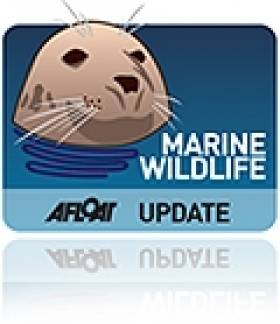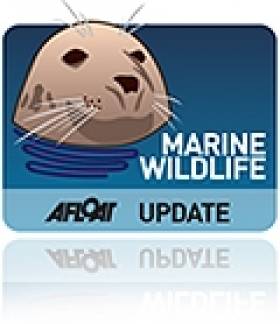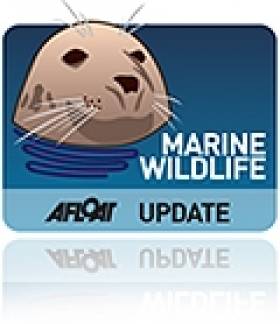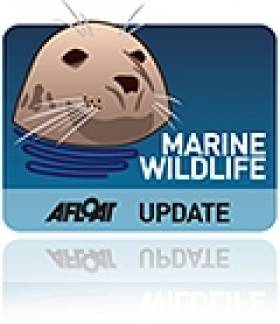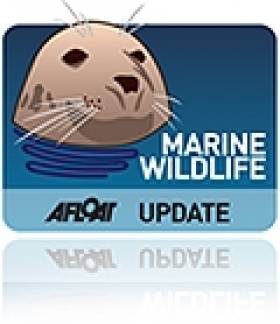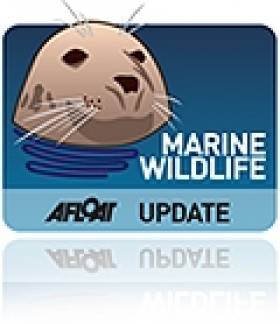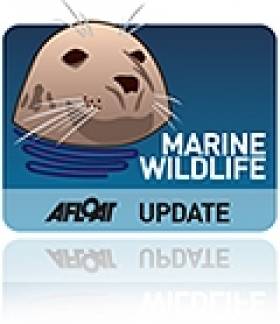Displaying items by tag: marine wildlife
Brothers Come To Rescue Of Stranded Seal Pup
#MarineWildlife - A stranded baby seal rescued by three brothers on the Dingle Peninsula was one of five washed up around the Irish coast during the stormy bank holiday weekend, as the Irish Independent reports.
Fifteen-year-olds Marwin and Leon O'Sullivan from Co Cork quickly got in touch with the Dingle Wildlife and Seal Sanctuary when they found the female grey seal pup, still with its fur coat, alone on Clogher Strand.
She's since been named Lena by seven-year-old Leon O'Sullivan and is in the care of the Dingle sanctuary, who said another pup was found on a beach in Mayo yesterday 29 October.
Dubliner Snaps Seal's Deadly Dance With Great White Shark
#Jaws - The Mail Online has published a series of incredible photographs showing a young seal's lucky escape from the jaws of a great white shark.
David Jenkins from Dublin snapped the seal's perilous encounter with the dangerous marine beast from a tour boat off the coast of Cape Town in South Africa - a favourite haunt for the killer fish made infamous by the movie Jaws.
Some of the astounding shots show the seal balancing on the shark's nose as it tries to snap itself a meal.
Others clearly show the great white's startling rows of razor sharp teeth as it pursues its prey.
But despite the shark's amazing speed and agility for its size, the smaller and lithe seal used its own quickness and manoeuvrability to narrowly avoid meeting its maker.
See the Mail Online's shark-versus-seal photo gallery HERE.
Irish Teens Begin 'Blue Zoo' Filming In Australia
#OnTV - Four Irish teenagers are currently having the time of their lives filming a new marine wildlife documentary series in Australia, according to RTÉ's The Entertainment Network.
As previously reported on Afloat.ie, Blue Zoo will follow the exploits of the four Irish young people teaming up with four Australian teens to work with rescued dolphins, seals and turtles at a marine wildlife park in Coffs Harbour, New South Wales.
Aurea Kenny, Sophie O'Loughlin-Kennedy, Tallann Maguire and Darragh Joyce will spend the next six weeks with their Aussie counterparts training with and caring for wildlife, and filming for the show - which will be broadcast on RTÉ Two and Australia's ABC3 next year.
RTÉ TEN has more on the story HERE.
New Book Questions The 'Truth' About Dolphin Smarts
#MarineWildlife - The Daily Express looks to two of Ireland's resident cetaceans, Duggie and Fungie, for answers to the question of whether dolphin intelligence is truly all it's cracked up to be.
Dingle's famous dolphin Fungie should need no introduction, but the story of Duggie might be new to you: this dolphin apparently befriended a labrador named Ben after losing her own mate in the waters around Tory Island off Donegal.
Both dolphins are remarkable for the relationships they've formed with different species - see the story of a Dutch couple's bonding with Fungie over more than two decades for further evidence.
However, some scientists want to throw water on the notion that dolphins are humans' closest intellectual peers in the animal kingdom.
"In terms of intelligence they are nowhere near as special as they have been portrayed," says zoologist Justin Gregg, who has written a new book, Are Dolphins Really Smart?, that questions the widely-held wisdom that dolphins have superior brains to the likes of dogs, or that the complex sounds they make are language.
But is is really such a stretch to say that dolphins have a language of their own? Only last year US marine science boffins were baffled by a beluga whale who spontaneously mimicked human speech - in what sounded like a Donegal Irish accent.
The Daily Express has much more on the story HERE.
Irish Wildlife Showcased In New BBC TV Production
#OnTV - Footage of fin whales filmed by the BBC off the coast of Ireland in November 2012 is set to feature prominently in a new TV series called The Great British Year.
The programme, which airs on BBC One at 9pm on Wednesdays until 23 October (repeated Sunday afternoons at 4:50pm) documents the nature of the British Isles through the seasons.
The whale footage, filmed with West Cork-based whale watch operator Colin Barnes of Cork Whale Watch, will feature in the last programme of the series on Wednesday 23 October.
“It’s great to see Irish wildlife showcased in this way,” said Calvin Jones, founder and managing editor of Ireland’s Wildlife. “We have some amazing wildlife here in Ireland, and I believe there’s real potential to develop wildlife tourism in a sustainable and informed way that will benefit both local communities and wildlife.
"Whale watching is an important part of that. Many people don’t realise that Ireland is one of Europe’s whale and dolphin hotspots. Almost a third of all cetacean species have been recorded in Irish waters, and some, including fin whales and humpback whales, are regular visitors to our coasts.
“Autumn and early winter - so from early October to about the end of December - is peak large whale season off the south west coast, and offers fantastic opportunities to get out and see these amazing creatures first hand,” he added.
Fin whales are the second largest animal on earth - only blue whales grow bigger. Every year they visit Ireland’s south coast in numbers to feed on the large shoals of herring that gather there.
Thousands Of Marine Creatures Under Threat As NI Aquarium Faces Closure
#MarineWildlife - More than 3,000 marine animals could be destroyed if plans to close Northern Ireland's only aquarium go ahead, it has emerged.
UTV News reports that Ards Borough Council voted last night (25 September) to delay the closure of the Exploris aquarium and seal sanctuary in Portaferry, Co Down for two months in the hopes of securing necessary funding from Stormont - and in the face of mounting protest against the closure plans.
But the centre has not ruled out killing off its collection of 3,307 marine creatures if the shutters come down for good, according to the Belfast Telegraph.
It's also claimed by pressure group Marine Conservation Northern Ireland that juveniles born in captivity at the facility are already being culled - though this has been strenuously denied by Ards Borough Council.
Exploris was opened as the Northern Ireland Aquarium in 1987 and operated by the council ever since, though the economic downturn led to a funding crisis made worse when an intended private investor, Livingstone Leisure, pulled out of a management deal over pension arrangements.
UTV News has much more on the story HERE.
Irish Sea A 'Breeding Ground' For Dolphins Say Manx Researchers
#MarineWildlife - Five Risso's dolphin calves spotted by researchers off the Isle of Man this summer point to the waters of the Irish Sea as a breeding ground for the gregarious marine mammals.
As BBC News reports, the five calves were seen north of the Calf of Man at the end of July.
And according to a spokesperson for the Manx Whale and Dolphin Watch: "It means Manx waters must be important to the breeding population of Risso's dolphins in the Irish Sea."
The waters between the east coast of Ireland and north-west England and Wales are known to be teeming with dolphins of different species, with video of a dolphin 'superpod' wowing ferry-goers earlier this year.
BBC News has more on the story HERE.
Dead Calf Linked To Doolin Dolphin
#MarineWildlife - The Irish Whale and Dolphin Group (IWDG) has confirmed that a dead dolphin calf found washed up near Doolin in Co Clare almost three years ago was likely born to Dusty the dolphin, who's been the subject of much controversy over recent weeks.
Dr Simon Berrow of the IWDG writes that a sample was taken from the dead calf and stored for future genetic analysis. Similar samples were collected from Dusty by local diver and award winning photographer George Karbus, and these were sent to marine researcher Marie Louis at the Centre d’Etudes Biologiques de Chizé, France as part of her PhD project.
Louis recently analysed these samples and determined that Dusty and the calf shared the same haplotype, a genetic marker that points to a very likely relation between the two dolphins.
"Given the recent behaviour of Dusty in Doolin and suggestions locally that she gets more aggressive when she is pregnant, this latest analysis is relevant as it shows that Dusty is sexually mature, interacts and mates with other dolphins and has at least on one occasion had a calf," writes Berrow.
Last week the victim of an attack by the 14-year-old female bottlenose dolphin at Doolin has called for a total swimming ban in the area.
Whale Watch Ireland 2013 - The Results Are In
#WhaleWatch - More than half the sites hosting events for the recent All-Ireland Whale Watch Day saw at least one whale, dolphin or porpoise, according to the Irish Whale and Dolphin Group (IWDG).
Reporting its stats from Whale Watch Ireland 2013 on Sunday 18 August, the IWDG says harbour porpoise, common dolphins and a minke whale were among the sightings nationwide at 16 events attended by a total of almost 1,200 people - a 30% increase on last year.
The best place to be was Galley Head in West Cork, where newbie and veteran whale watchers alike saw the only minke whale of the day, not to mention the largest concentration of common dolphins.
Dolphins were also visible off Downpatrick Head in Mayo despite the poor weather. But it was harbour porpoise that were in plentiful supply in the Dublin area (off Howth Head and in Killiney Bay) and Portmuck in Co Antrim.
As previously reported on Afloat.ie, All-Ireland Whale Watch Day coincided with Ireland's Heritage Week events for 2013.
Dolphins Decimated By Disease On America's Atlantic Coast
#DolphinDeaths - Hundreds of bottlenose dolphins have died in strandings along the east coast of the United States this summer - and a measles-like virus could be to blame.
As The Irish Times reports, the National Oceanic and Atmospheric Administration (NOAA) is currently investigating the extraordinary die-off, which has been tentatively connected to morbillivirus, an immune system suppressor similar to the virus that causes human measles.
In numbers not seen since the late 1980s, as many as 333 dolphin carcasses have been found on the shoreline between New York and North Carolina, more than 10 times the average for this time of year.
Researchers from universities and marine institutes are concentrating on the Virginia coastline, where the majority of the dead cetaceans have been found, and believe they have identified evidence of morbillivirus in nearly all sampled carcasses.
Wired Science says scientists do not yet know what caused the outbreak, though they speculate that dolphins may simply have lost their natural immunity to the virus since the last attack.
And according to the NOAA's Teri Rowles: “At this point, there isn’t anything to stop the virus.”
As of yet there are no indications if the virus could migrate to dolphin populations on this side of the Atlantic, particularly in the designated cetacean sanctuary of Irish waters.
Wired Science has much more on the story HERE.


























